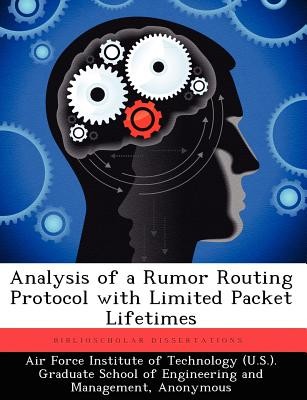
- We will send in 10–14 business days.
- Author: Peter R Francik
- Publisher: BiblioScholar
- ISBN-10: 1249456525
- ISBN-13: 9781249456520
- Format: 18.9 x 24.6 x 0.5 cm, softcover
- Language: English
- SAVE -10% with code: EXTRA
Analysis of a Rumor Routing Protocol with Limited Packet Lifetimes (e-book) (used book) | bookbook.eu
Reviews
Description
Wireless sensor networks require specialized protocols that conserve power and minimize network traffic. Therefore, it is vitally important to analyze how the parameters of a protocol affect these metrics. In doing so, a more efficient protocol can be developed.This research evaluates how the number of nodes in a network, time between generated agents, lifetime of agents, number of agent transmissions, time between generated queries, lifetime of queries, and node transmission time affect a modified rumor routing protocol for a large-scale, wireless sensor network. Furthermore, it analyzes how the probability distribution of certain protocol parameters affects the network performance.The time between generated queries had the greatest effect upon a network's energy consumption, accounting for 73.64% of the total variation. An exponential query interarrival distribution with a rate of 0.4 queries/second/node used 25.78% less power than an exponential distribution with a rate of 0.6 queries/second/node. The node transmission time was liable for 73.99% of the total variation in proportion of query failures. Of three distributions, each with a mean of 0.5 seconds, the proportion of query failures using a Rayleigh transmission time distribution was 14.23% less than an exponential distribution and 18.46% less than a uniform distribution. Lastly, 54.85% of the total variation in the mean proportion of time a node is uninformed was a result of the time between generated agents. The mean proportion of time a node is uninformed using an exponential agent interarrival distribution with a rate of 0.005 was 6.59% higher than an exponential distribution with a rate of 0.01.
EXTRA 10 % discount with code: EXTRA
The promotion ends in 17d.23:51:46
The discount code is valid when purchasing from 10 €. Discounts do not stack.
- Author: Peter R Francik
- Publisher: BiblioScholar
- ISBN-10: 1249456525
- ISBN-13: 9781249456520
- Format: 18.9 x 24.6 x 0.5 cm, softcover
- Language: English English
Wireless sensor networks require specialized protocols that conserve power and minimize network traffic. Therefore, it is vitally important to analyze how the parameters of a protocol affect these metrics. In doing so, a more efficient protocol can be developed.This research evaluates how the number of nodes in a network, time between generated agents, lifetime of agents, number of agent transmissions, time between generated queries, lifetime of queries, and node transmission time affect a modified rumor routing protocol for a large-scale, wireless sensor network. Furthermore, it analyzes how the probability distribution of certain protocol parameters affects the network performance.The time between generated queries had the greatest effect upon a network's energy consumption, accounting for 73.64% of the total variation. An exponential query interarrival distribution with a rate of 0.4 queries/second/node used 25.78% less power than an exponential distribution with a rate of 0.6 queries/second/node. The node transmission time was liable for 73.99% of the total variation in proportion of query failures. Of three distributions, each with a mean of 0.5 seconds, the proportion of query failures using a Rayleigh transmission time distribution was 14.23% less than an exponential distribution and 18.46% less than a uniform distribution. Lastly, 54.85% of the total variation in the mean proportion of time a node is uninformed was a result of the time between generated agents. The mean proportion of time a node is uninformed using an exponential agent interarrival distribution with a rate of 0.005 was 6.59% higher than an exponential distribution with a rate of 0.01.


Reviews